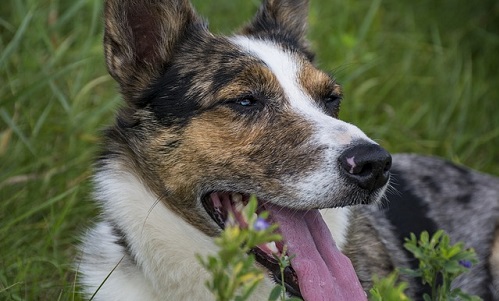Pneumonia is a very common lung infection that can cause humans to experience uncomfortable symptoms such as fever, cough, chills, shortness of breath and chest pain. Usually, those diagnosed with pneumonia are prescribed medication such as antibiotics, rest, and fluids. Pneumonia can also be contagious. So what do you do when you’re contagious and not feeling well? Relax on the couch with a blanket, some hot tea, and Netflix, right? And, most of your friends and family will stay at a distance as not to get sick themselves.
But who never leaves your side when you’re sick – your canine best friend of course. Then you think, oh no – “Can dogs get pneumonia too?” Although it’s not a common illness that dogs experience, unfortunately, they too can contract pneumonia. Let’s talk about what to look for and what to do if you think your pet may have this lung infection.
Causes of Pneumonia
Here we’ll start with how your dog can get pneumonia and what causes it. The most common type of pneumonia in dogs is bacterial pneumonia which is just what it sounds like, a canine bacterial infection. Bacterial pneumonia is contracted via inhaling bacteria or fungi into the lungs from coughing or sneezing, it then causes inflammation for dogs and infection. It’s most common in puppies under one, elderly dogs, or those with pre-existing respiratory disease or a compromised immune system.
 There are also different types of pneumonia that have separate root causes. Although even less common than bacterial pneumonia, dogs can also be diagnosed with aspiration pneumonia and interstitial pneumonia. Aspiration pneumonia is caused by inhaling foreign matter such as food, vomit or fluid into the airway that results in inflammation. Interstitial pneumonia is a lung disease where the lung tissue is replaced with scar tissue, significantly reducing their ability to breathe properly.
There are also different types of pneumonia that have separate root causes. Although even less common than bacterial pneumonia, dogs can also be diagnosed with aspiration pneumonia and interstitial pneumonia. Aspiration pneumonia is caused by inhaling foreign matter such as food, vomit or fluid into the airway that results in inflammation. Interstitial pneumonia is a lung disease where the lung tissue is replaced with scar tissue, significantly reducing their ability to breathe properly.
Symptoms
There are several signs and symptoms of pneumonia to keep an eye out for in your pup. You may notice that your dog is lethargic or coughing, dogs can exhibit similar symptoms to that of a human who has been diagnosed with pneumonia. The range of symptoms your dog could experience include:
- Fever
- Cough
- Fatigue
- Wheezing
- Difficulty breathing or rapid breathing
- Runny nose
- Decreased appetite
Like many infections, pneumonia can turn fatal very quickly. So as always, if your playful pup isn’t so playful and showing some of the signs and symptoms we mentioned – it’s a good idea to bring him to the vet to be evaluated as soon as possible. What may seem like a minor reaction can turn into a major problem. Pneumonia can cause significant inflammation to the lungs and can lead to severe breathing difficulties or worse if left untreated.
Diagnosis
As a pet owner, it can be hard to identify what’s wrong with your pet. There are several reasons your dog may be coughing, such as having particles of food stuck in his throat or experiencing a canine allergic reaction. That’s why it’s always good to rely on your vet to research, diagnose and treat the problem. Being diligent and doing your best to recognize when there’s a serious problem is important to keep your pup safe and healthy.
After evaluating your dog, the vet will take several steps in order to effectively and correctly diagnose whether or not your pup has pneumonia. Those tests may include:
- Chest x-rays
- Blood and/or fecal samples
- Lung auscultation (listen to lungs with a stethoscope)
Treatment
 Treatment ranges from antibiotics to additional medication or methods of healing based on the severity of their illness. Those treatments could be oxygen therapy or a nebulizing treatment, antimicrobial medication or IV therapy. For those with less severe symptoms, your pet can mostly be treated at home. The vet will prescribe an antibiotic that can be administered by you at home. Over the next few weeks, you should see their symptoms decrease and energy increase. You’ll need to continuously monitor him to ensure that he’s eating and drinking enough. If symptoms don’t improve, your best bet would be to go back in to see the vet for a check-up.
Treatment ranges from antibiotics to additional medication or methods of healing based on the severity of their illness. Those treatments could be oxygen therapy or a nebulizing treatment, antimicrobial medication or IV therapy. For those with less severe symptoms, your pet can mostly be treated at home. The vet will prescribe an antibiotic that can be administered by you at home. Over the next few weeks, you should see their symptoms decrease and energy increase. You’ll need to continuously monitor him to ensure that he’s eating and drinking enough. If symptoms don’t improve, your best bet would be to go back in to see the vet for a check-up.
Prevention
If you’ve asked yourself “can dog’s catch pneumonia?”, the unfortunate answer is yes. But don’t worry, it does not mean your pup’s illness is a death sentence for him. The first step to prevention is vaccination. Vaccines can help prevent infections that ultimately lead to illness such as pneumonia. To reduce further spread of the illness, you’ll want to keep your dog who has been diagnosed with pneumonia separated from any other pets in your home. Be sure to disinfect his food and water bowls, toys, and any bedding or blankets. Keep your furry friend happy and healthy with annual visits to your local vet and by staying up-to-date on vaccines. If your pet does have to endure pneumonia, we know you’ll be there to comfort him and create their own “Netflix and chill” zone filled with warm blankets and their favorite chew toys.
Sources:
- “Pneumonia (Bacterial) in Dogs.” PetMD, Accessed 6 Jan 2019. www.petmd.com/dog/conditions/respiratory/c_multi_pneumonia_bacterial.
- “Can Dogs Get Pneumonia?” WagWalking, 7 Aug. 2017, Accessed 6 Jan 2019. www.wagwalking.com/wellness/can-dogs-get-pneumonia.
- “Aspiration Pneumonia in Dogs.” Pet Health Network, Accessed 6 Jan 2019. www.pethealthnetwork.com/dog-health/dog-diseases-conditions-a-z/aspiration-pneumonia-dogs




